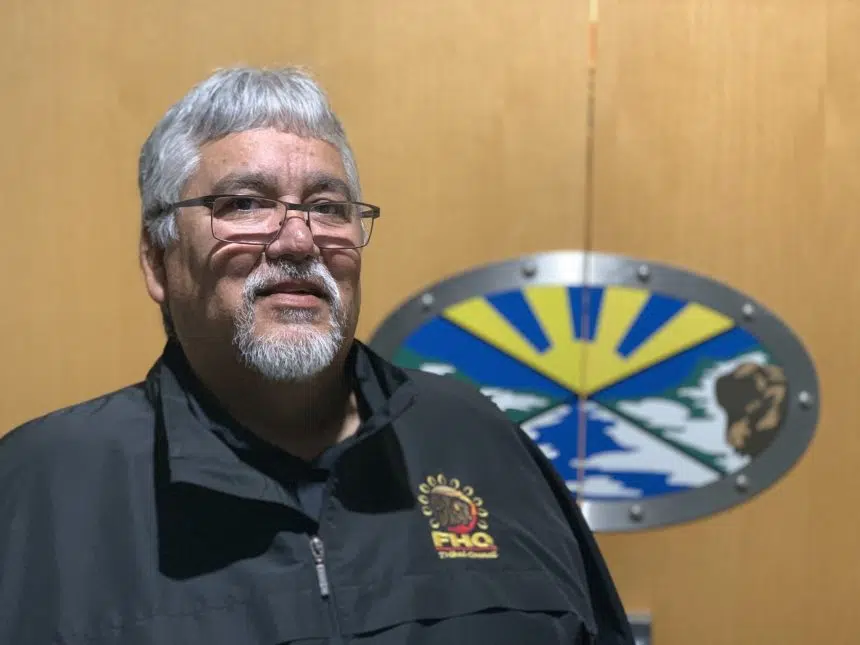The recipient of a national award for maintaining First Nations water systems is from the Carry the Kettle Nakoda Nation, but he first learned the trade thousands of kilometres away from Saskatchewan, hunkered deep down inside U.S. naval ships.
“Being in the Navy, I barely got to see the ocean. I was down, tucked inside the ships those days. I wouldn’t see daylight for a few days,” Deon Hassler said.
He has won the second annual First Nations Water Leadership award this year for his work in the Treaty 4 area as the File Hills Qu’Appelle Tribal Council’s (FHQTC) circuit rider technician.
When a water or sewage treatment plant in one of the band’s 11 First Nations needs a fix or an upgrade, he’s the guy to call.
He likened working on the Prairies to working on a ship in the middle of the ocean.
“It’s just as flat,” he joked.
Hassler was born in California, but his family is from Carry the Kettle, which sits about 100 kilometres east of Regina; he moved to Saskatchewan about 30 years ago.
He first trained as an engineer while in the U.S. Navy. It was there he was in charge of repairing and maintaining water boilers and sewage systems on the American military ships.
His service took him around the world in 1985. His crew had stops in Okinawa, Japan, Singapore, Hong Kong, Thailand, South Korea, Philippines and three times in Hawaii.
He said he’s grateful for that time and the work, but he’s glad he returned to his roots at Carry the Kettle.
“I do like the people here in Saskatchewan. All the people I get to meet on this job; it’s very pleasant, hearing some of those stories, it’s just very rewarding, just to get to talk to some of these guys,” Hassler said.
“I go around to every community in the File Hills Qu’Appelle Tribal Council and work with the water operators and mentor them. Basically, I help them troubleshoot if they have any problems, to help keep things going.
“The main part of our job is to train these operators and maintain the water plant so there are no breakdowns or less breakdowns. We’re making sure they get everything they need.”
He’s on the phone every day helping the operators and has to visit a water treatment facility at least once a week.
But it’s a tough slog, in terms of ensuring every community’s water is on par with where it should be, he said.
“When it comes to repairs at the water plant, bands don’t really have money to fix some of the equipment. It breaks down from one thing or another,” Hassler said.
It’s also hard to find people who want to work as water plant operators. He noted the job pays roughly only $28,000 per year.
Tribal bands need to be willing to pay a livable salary, but so too should the federal government commit more money to treating and maintaining clean water conditions on First Nations, Hassler said.
He has held his current job for six years. He credits the current federal government with the money it has put forward to help with water treatment on First Nations.
Winning the award, which is given out by Indigenous Services Canada, is special for him, but Hassler said he finds it more rewarding to mentor and teach other, younger water operators.
That’s in part because he wants to give back, in part because they are undereducated and underpaid, he said.
He offers weekly three-hour classes, which helps them work toward getting certified.
“We also do on-site training, so I show them the equipment, how to prepare it and how to operate it,” he said.
The money that Ottawa has given to support and sustain clean water on First Nations is a good thing, but communities still need more to upgrade their water systems. That would get them out of the cycle of “Band-Aid fixes,” he said.
Hassler didn’t put blame only on Ottawa or on individual First Nation councils; he said both parties need to do their parts.
According to Indigenous Services Canada’s website, 56 long-term drinking water advisories are in place on First Nations or public water systems across Canada, as of Sept. 3.
The website also states that 87 long-term drinking water advisories have been lifted since November 2015. The federal agency says its goal is to lift all long-term drinking water advisories by March 2021.







